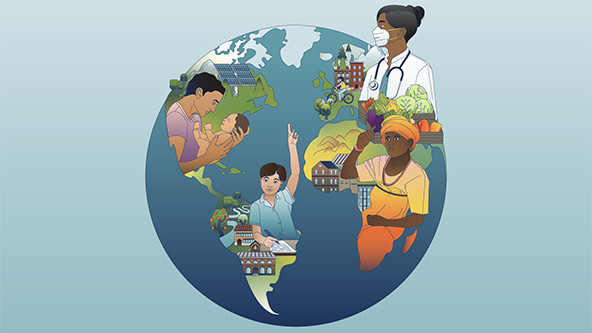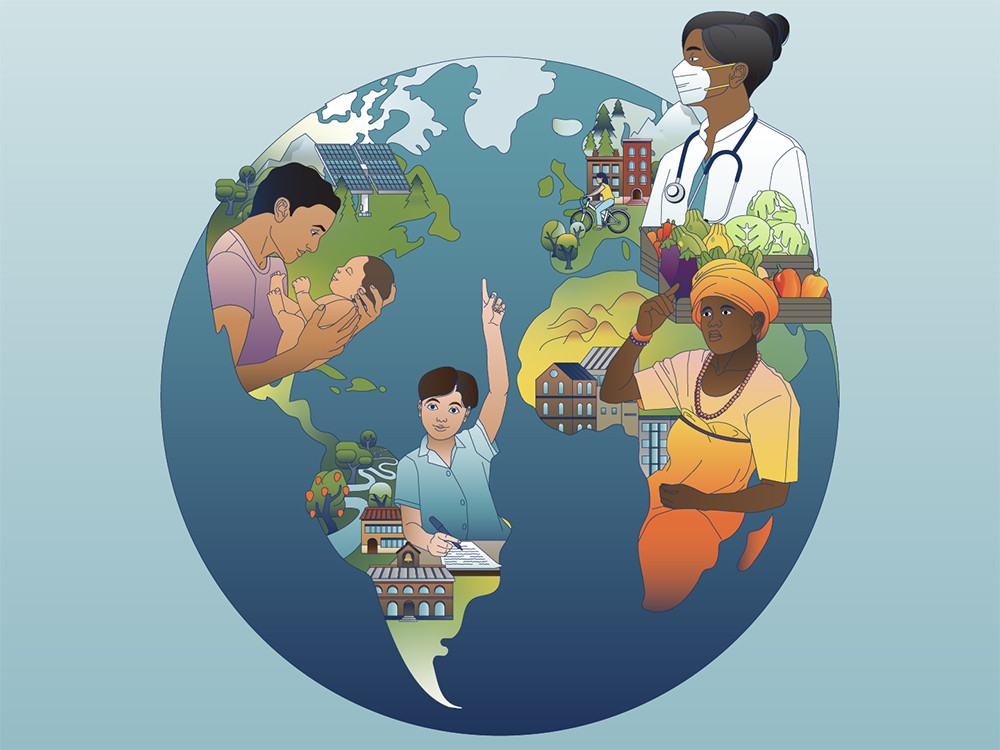 (Illustration courtesy of the Robert Wood Johnson Foundation)
(Illustration courtesy of the Robert Wood Johnson Foundation)
It’s hard to imagine a world without borders. Yet for most of human history that’s exactly what life was like. Yes, of course there have always been natural borders, like mountain ranges and bodies of water that restrict travel, but formal political borders that divide countries are a more recent phenomenon. In fact, over half of all national borders were created in the 20th century. The creation of borders is for the most part a sad history marked by conflict, colonialism, and war.
Borders create unnecessary and harmful barriers not just between people and resources but also ideas.

Consider this: A 2023 survey conducted by Candid amongst people working in philanthropy found that 66 percent of US funders’ grantmaking is not informed or inspired by global ideas. Given the myriad of interconnected problems the world is facing, it’s a number that should be troubling to anyone.
But this is particularly unnerving to me. As a multiracial person—and as an anthropologist by training—I intentionally cross boundaries in every aspect of my life, from household decor to food to my own values. With over 20 years of experience working on global health, and now as the person who directs global learning strategies for the Robert Wood Johnson Foundation (RWJF), the largest health and health care foundation in the United States, I’ve seen directly how ideas developed in one place can improve health in another. Community health workers represent perhaps the most impactful example: A concept that originated in Chinese barefoot doctors is now a core element of most health systems around the globe.
Unequal health outcomes are sadly not unique to the United States. Too many global health crises, rooted in inequity, play out in silos or isolation across every continent. Yet we know, as studies have confirmed, that some communities and countries are making greater progress in addressing them than others. Both problems and solutions are inequitably distributed.
There are many reasons for not seeking or spreading ideas from one country to another. We know that country of origin bias, the idea that we judge the merit of an idea based on our attitudes about the country from which it came, is real. Journalists tell us that the stories they write about domestic issues gain much larger readership than those about global issues—perhaps a form of proximity bias, where we instinctively favor people and/or ideas that are physically closer to us. We also have systems of knowledge that center the English language and predominantly view high-income, Western countries as authoritative.
Whatever the reason, we must realize there is much we can learn from each other when it comes to solving the world's most pressing problems—and act accordingly.
Beyond Borders is an essay series featuring ideas from around the world that can inspire and inform efforts to create better health and well-being in your community. From Australia to Rwanda, from Bogota to New Zealand, and from Sweden to South Africa, we see communities that have made progress in tackling the same kinds of problems that communities in the United States and other nations are struggling with. It is imperative that we learn from them as quickly as possible.
This series will explore not only promising solutions but also the barriers to global learning that keep us from looking beyond our shores more often. It will lift up perspectives and voices from countries and cultures that have historically been marginalized in our current health and science knowledge system (i.e. the system and rules that govern who decides what knowledge is and isn’t shared and with whom).
Below are three primary reasons for looking beyond our borders, with some illustrative examples from just a few of our upcoming essayists.
The Practical
The reality is that good ideas should have no borders. If you are struggling with a problem in your community, why would you limit potential solutions to only those created in your own state or country? Should we deny kindergarten to our children because it originated in Germany, or neglect our oral care because the toothbrush was invented in China? Of course not.
We realize that not all ideas will translate directly from one place to another. There are significant cultural, political, and societal differences between places that may limit their relevance. But principles and practices almost always travel well and can serve as inspiration. That is the premise behind RWJF’s Reimagined in America webinar series, where we facilitate conversations and discussion around what’s working abroad on issues ranging from transforming health care to building community power to advancing climate justice. Our desire to learn has taken us all around the world, because a community looking to reduce violence or a mother praying for a healthy baby is more concerned with the outcome than where the solution originated.
Dr. Agnes Binagwaho is a pediatrician in Rwanda where the maternal mortality ratio has dropped by 60 percent. In her upcoming essay, she notes how critical it is to solve the problem expectant moms are actually facing—not what we assume the problem to be. This means engaging with humility and actively listening. For example, Dr. Binagwaho emphasizes the importance of addressing transportation needs critical to ensuring access to care. Her experience should be of interest to anyone struggling to address poor maternal outcomes in their community.
Similarly, in another upcoming essay, Fabiola Cineas, a reporter on race and policy for Vox Media, will chronicle her journey to New Zealand to learn about their experience in truth, healing, and reparations for the Māori people and what countries like the United States can learn from their blueprint for redress and atonement.
The Communal
Too often, we feel we are the only people struggling with a particular problem, whether it’s fighting for universal health care access, healing from the trauma of racism, or improving maternal health outcomes. Global learning helps us understand that we are not alone. In the early days of the COVID-19 pandemic, no one had answers to much of anything. But we found solidarity in struggling together and as a global community we identified problems and found solutions—not only a vaccine but how to prevent transmission and how to support essential workers. How many of us found comfort in watching Italians sing from their balconies?
Learning in any form is by nature relational. It’s why we work at universities or other institutions of higher learning. It’s why we join organizations, attend conferences, or volunteer for work groups. Fortunately, with the advent of technology that connects us and the ability to travel freely, we are not bound by our immediate surroundings when seeking a community of global learning.
For example, Mehrnaz Ghojeh leads climate action implementation for C40 Cities. In her upcoming essay, she’ll share how this organization, a network of nearly 100 world-leading cities taking urgent action to confront the climate crisis, leveraged their community to help address problems stemming from the pandemic. Similarly, Tony Pipa, senior fellow at the Center for Sustainable Development at the Brookings Institution, will share how global relationships have advanced multidisciplinary solutions to local problems while contributing to global progress on the Sustainable Development Goals.
Both experiences will illustrate the value of being part of a growing community of global learners who can be counted on for advice and inspiration in times of need and opportunity.
The Moral
Finally, and perhaps most importantly, there is a moral imperative to be open to new ideas from around the world and to question the origins of old ideas we take for granted. Global learning provides an important inflection point to question the morality of how and who decides what knowledge others see and share.
Not only have borders been historical constructs of wealth and power; they unfairly reflect whose ideas have mattered, what languages have been preferred. As places throughout history have been colonized, people were told that their own traditions don't matter and what’s important, what is to be prioritized, are the norms and concepts of the colonizers. Part of the process of setting up borders includes erasing not only people but other knowledge traditions.
Questioning the origin of our knowledge and lifting up marginalized voices is part of our moral obligation to decolonize and repair our broken knowledge systems. As the Robert Wood Johnson Foundation is rooted in advancing equity and committed to addressing systemic racism, this is a recurring theme you’ll find throughout this series.
For example, Dr. Donald Warne, co-director of the Center on Indigenous Health at John Hopkins University, will share how Indigenous knowledge and practices have often been marginalized in the context of Western health and how elevating them is not only the morally right thing to do but is also practical in improving health and well-being.
In thinking about the world and its many problems, I often find comfort in those pictures taken from space looking back at the earth. These awe-inspiring “blue marble” photographs remind us of a world beyond borders.
While I’ve never been to space and looked back on our planet, I do fly a lot. A few months ago, flying to Frankfurt, Germany, from Valencia, Spain, I saw stunning views of the Alps cutting across Italy, France, Switzerland. Of course there were no lines demarcating one country from another. But in the plane magazine, there was a map of flight paths; a large spider web connecting places and countries. I imagine ideas freely flowing from country to country in the same way. Each line, like a flight map, represents a problem solved, an opportunity met, a more equitable outcome, someone’s health improved, a life saved.
This is the potential of a world that values and practices global learning and goes beyond borders—in our minds and in our world. I hope you’ll join us in this journey by following this series and by sharing your own stories of global learning.
Support SSIR’s coverage of cross-sector solutions to global challenges.
Help us further the reach of innovative ideas. Donate today.
Read more stories by Karabi Acharya.

